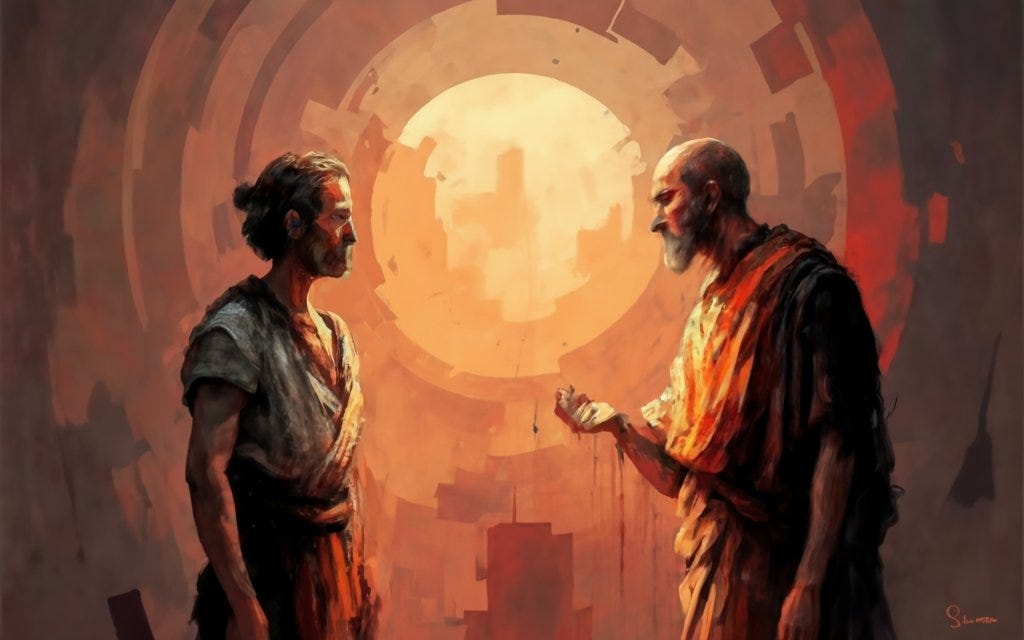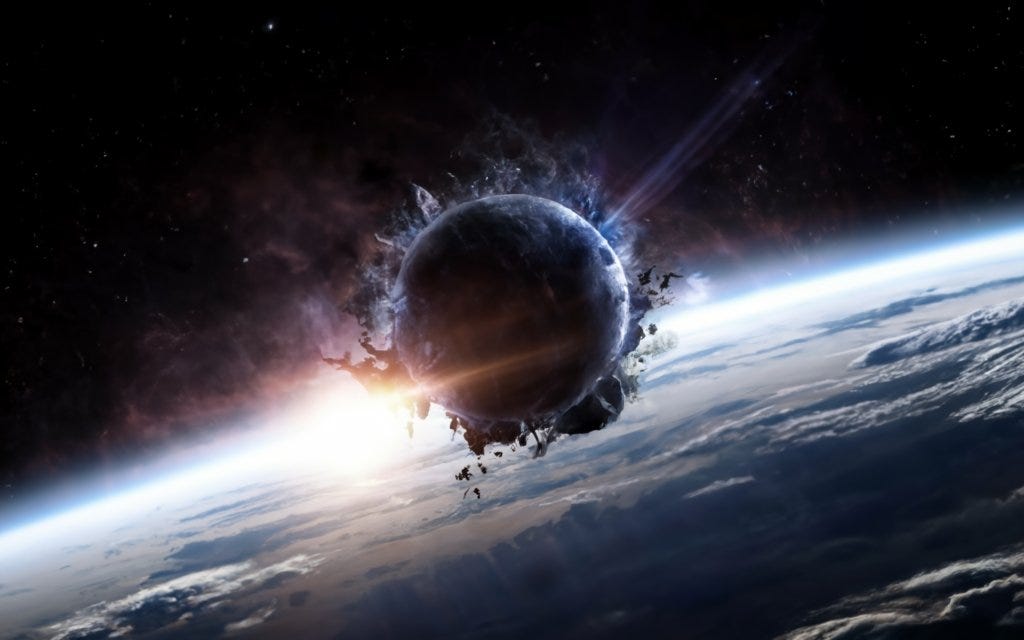Our Universe isn’t known for leniency.
Gravity will not be dismissed. The laws of thermodynamics aren’t fungible. Entropy stalks us in the night.
Try to live in defiance of the universe’s underlying principles and you’ll quickly find out how unforgiving they are.
Yet an all-star cast of ancient philosophers — and not a few modern scientists and engineers — suggest there are other universal principles we’re ignoring, and our inattention is costing us.
Love is at the top of the list.
The Socratic Universe:
Socrates tells us (through the pen of Plato) the entire universe is “held together by communion and friendship, by orderliness, temperance, and justice; and that is the reason…why they call the whole of this world by the name of order, not of disorder or dissoluteness.1”
Imagine Socrates listing recognized scientific laws: Kepler's laws of planetary motion, gravitation, and Einstein's theory of relativity. Then he tacks on unexpected additions — reason, civility, moderation. He’s daft. These are two different categories of things, Socrates!
Yet Socrates dresses down the brilliant but immoral sophist Callicles similarly to how we’d warn a child to beware gravity because stumbles lead to scraped knees.
“(You) have failed to observe the great power of geometrical equality,” Socrates tells him, “…you hold that self-advantage is what one ought to practice, because you neglect geometry.2”
Many modern readers will balk at the idea that ethical or moral guidelines are hardcoded into the universe, or can be extrapolated from how it’s set up. They believe modern science has unveiled a random and chaotic universe. While recognizing certain scientific laws, they insist the universe is not ordered in a way that infers values.
But such assumptions were once taken for granted.
The Faltering Stoic Universe
The ancient Stoics took Socrates’s ideas and systematized them into a practical philosophy whose precepts require an ordered, rational, and providential universe that can be studied and understood.
They thought our universe was divine. Not as modern religions imagine god — that analogy leaves the wrong impression.
The Stoic universe doesn’t intervene in human affairs, but its values and principles flow through nature. Everything is part of it, including us, which makes us divine too.
Cicero has the Stoic philosopher Balbus summarize his school’s view: “we can assume that the universe must possess wisdom and that the element which holds together all that exists excels in perfect reason. From this we see that the universe is in fact God and that the vital force of the universe is held together by this divine nature.3”
Indeed, according to classical scholar A.A. Long, Stoics think the universe is “amenable to rational explanation” because it is “rationally organized.4”
Humans are endowed with rationality, the Stoics say, so we’re capable of understanding and participating in the natural order of the universe. We’re not reliant on ancient texts, prophets, or philosophers — science, observation, and reason tell us what we need to know.
More critically, Stoics think we benefit from understanding the universe and aligning ourselves with it. Mountain climbers ignorant of gravity won’t last long, and those who don’t understand the moral implications of the universe will suffer too, but perhaps in less obvious ways.
Stoics align with nature by acting, thinking, and speaking virtuously. This means striving to be wise, just, courageous, and disciplined. They think doing so leads to eudaimonia: a background layer of flourishing and contentment beyond the normal ups and downs of daily emotion.
Conversely, Stoics think vice backfires, even if it gets people what they want — money, leisure, power, prestige, or whatever. There’s something about pushing against the organizing principle of the universe that erodes human flourishing.
Although Stoicism was built to be inseparable from these ideas, most attempts to present the philosophy to modern audiences, such as Lawrence Becker’s 1999 classic, “A New Stoicism,” dismiss any suggestion that virtue echoes something deeper about reality. Many modern works suggest the Logos, or divine reason, is out of step with science and a bit embarrassing for an educated person.
But perhaps the issue is that when we imagine a universe that’s ordered and conscious, we imagine a human mind with all its contradictions.
But the universe is not the human psyche writ large.
Science’s Thinking Universe
The universe thinks.
Hold on. Hear me out.
I’d like to discuss and expand on some of the research put forward by tech ethicist
5.Let’s start by asking ourselves what the minimum viable computing modality that counts as intelligence looks like. How much does the scale of it matter? What’s your litmus test?
I don’t know about you, but it blows my mind that a bucket of water can function as a perceptron, which sorts numbers into different classes based on attributes (pattern matching)6. With the Marangoni effect, liquids find the optimal path out of a maze7.
Water isn’t traditionally something I’d ascribe even the most rudimentary intelligence to, but this field of inquiry gave rise to liquid-state machine computers, which some researchers think explain how brains work8.
Computing is also present in tiny unicellular organisms. Euplotes eurystomus, for instance, conducts computations to figure out how to walk over submerged detritus and vegetation with its fourteen appendages9.
Matter doesn’t need silicon microchips or human brains to compute. Configure a wide range of physical matter in the right way and you can scale it into a neural network10.
What is a human but billions of little cells corralled into cooperation for the good of the whole? What is human society but this sort of network scaled up? It’s not just that humans use their brains to cooperate. It’s that human brains literally network with each other. Our grey matter somehow syncs when we socialize. This is associated with feelings of connectedness, cooperation, and “self-other merging.”11”
This undermines the long-standing view that human consciousness is a walled-off, first-person affair. Consciousness may be more of a shared experience than we realize.
Other earthbound examples of this scaling of consciousness include the “wood wide web” of Pando, 40,000 interconnected trees strung out across 106 acres in Utah, and a fungi colony spanning 2,200 acres in Oregon.
But many researchers argue this scaling and coordination goes far beyond earth and individual species, and that we see coordination across the universe on a massive scale.
One paper concludes, “Our results suggest that the scale invariance observed in many physical and biological systems might be due to some kind of learning dynamics and support the claim that the universe might be a neural network.12”
Science’s Anti-Entropic Universe
So what? Even if there’s an approximation of consciousness at various scales in the natural world, we don’t have to assume nature has underlying moral values.
It’s a dog-eat-dog world, right? Malthus has the last laugh. If wolves form a pack to take down an elk, we shouldn’t assume the wolves are good or evil.
But this picture is incomplete. Yes, entropy destroys things and creates disorder. It makes hot things go cold. It’s inexorable.
But localized systems push back and hold the line. They put up increasingly strong resistance to entropy, building order, complexity, and heat in pockets of negentropy.
Dr. Eric Chaisson, a Harvard astrophysicist who’s spent more than 50 years studying cosmic evolution, describes this in terms of energy.
He considers energy rate density a “single, unambiguous, quantitative measure of complexity—that helped to control entropy within increasingly ordered, localized systems evolving amidst increasingly disordered, wider environments, indeed that arguably governed the emergence and maturity of our galaxy, our Sun, our Earth, and ourselves.13”
Chaisson believes the universe is evolving towards greater energy density, complexity, and negentropy.
And we could consider this a reasonable conception of nature’s guiding principle — fight entropy. It’s in the implications of this idea where things start to get interesting.
Science’s Cooperative Universe
If the universe is about fighting dissolution and building order and complexity, what does that look like on a practical level?
Harvard researcher A. D. Wissner-Gross believes there’s a “deep connection” between intelligence and entropy, suggesting agents act within their systems to “maximize the overall diversity of accessible future paths of their worlds…Such behavior would then ensure their uniform aptitude for adaptiveness to future change due to interactions with the environment, conferring a potential survival advantage, to the extent permitted by their strength …and their ability to anticipate the future…14”
Optionality building and preservation confer a survival advantage. It’s considered a key to antifragility by philosopher Nassim Taleb in his book, Antifragile.
“Options, any options, by allowing you more upside than downside, are vectors of antifragility,” Taleb writes. “If you “have optionality,” you don’t have much need for what is commonly called intelligence, knowledge, insight, skills, and these complicated things that take place in our brain cells. For you don’t have to be right that often. All you need is the wisdom to not do unintelligent things to hurt yourself…and recognize favorable outcomes when they occur.”
We can war, pillage, steal, and capture all kinds of loot. The upsides of vice are tempting and immediate. But zero-sum actions destroy optionality, which impoverishes our future selves. A city you’ve looted and burnt generates no goods you can trade for, ideas and technologies you can use, nor does it provide sanctuary if your home is attacked.
Tech ethicist Nell Watson draws on this body of research to suggest we may be able to arrive at a definition of “good,” a “self-evident, evolutionary epiphany,” that once seen, can’t be unseen.
She suggests that “good” may look like:
Maximizing optionality by opposing entropy or maximizing negative entropy and collective benefit .
Doing so without coercion or cooption, and with mutual benefit in mind.
“We may even,” Watson writes, “define love in the same way. M. Scott Peck defined love as “The will to extend oneself for the purpose of nurturing our own or another’s spiritual growth.”
Perhaps, Watson suggests, “that loving sentiment is more applicable than we knew, expressing “the will of the universe” at all scales and across all time.”
She and collaborator Roshawn Terrell refer to this as Entropic Ethics Theory.
Stoics in an Entropic Universe
Ancient Stoics would balk at how entropic ethics theory affects elements of their cosmology. But they’d object far more to modern attempts to strip away the cosmology entirely. I imagine ancient Stoics wouldn’t find entropic ethics unreasonable if the underlying observations hold. That’s a big if; many of these ideas require scrutiny.
But I find it interesting that acting in accord with nature under either conception of it requires virtue in the Stoic sense.
Aligning with virtue seems likely to build pockets of negentropy and optionality, and promote love. Vice, on the other hand, ratchets entropy into high gear.
Classical virtue ethic systems are not justified by outcomes, of course. Virtue is not a means to an end. A Stoic isn’t virtuous to beat back entropy, or to achieve any virtuous goal. Stoics are virtuous because of virtue’s effects on character, but this only makes sense if it’s a reflection of the underlying structure of the universe. Modern takes on Stoicism impoverish the philosophy by stripping this away and simply do some hand-waving to justify how virtue is still the only good.
When the cosmos is in place as a backdrop, we can see what the result is. The Stoic emperor and philosopher Marcus Aurelius — who is sometimes dismissed as cerebral and dour — uses the term love 26 times in his journal, Meditations, a result of his focus on justice.
He is in perfect alignment with entropic ethics when he suggests that “What’s bad for the hive cannot be good for the bee.”
If the “universe’s will,” is the interconnection of things for mutual negentropy promotion, we cannot embrace vice. Most forms of it erode the fragile negentropic systems built painstakingly across centuries. Hurting the hive hurts us, even if we seem to be the better for it.
“We can only follow the example of Socrates,” the Stoic philosopher Epictetus said, “and if someone asks where we’re from, never say ‘I’m an Athenian’ or ‘I’m a Corinthian,’ but ‘I’m a citizen of the universe.15”
So Socrates was right to chastise Gorgias and insist his self-interest and vice showed he didn’t know how the universe worked.
We’re adrift in fragile negentropic lifeboats, floating in the void. Men like Gorgias go around punching holes in the hull, or cannibalize parts to make shiny baubles. People with morals spend their lives expanding the boat into something bigger and sturdier, even if they’re only trying to be just, courageous, moderate, and wise.
There will always be free riders and madmen, and Stoics argue we have no control of what others do and should instead focus on what we can do — be virtuous.
Whether or not entropy ethics holds up, I think it’s important for modern Stoics to consider how they can align their philosophy with the nature of the universe they inhabit, and reflect its values.
Updates may be necessary.
But as the Stoic philosopher Seneca wrote, “I will indeed use the ancient road — but if I find another route that is more direct and has fewer ups and downs, I will stake out that one. Those who advanced these doctrines before us are not our masters but our guides.16”
Plato. “Gorgias,” 508a
ibid
Cicero, “De Natura Deorum,” 2.30
Long, A.A. “Hellenistic philosophy; Stoics, Epicureans, Sceptics.” p. 108.
Watson’s ideas spurred me to write this article. Her work with collaborator Roshawn Terrell explores what they’ve begun to call entropic ethics theory. This video presents a good overview of her ideas. I’ll be checking out her forthcoming book.
Fernando, C, et al. Pattern recognition in a bucket.
Suzuno, Kohta, et al. Maze Solving Using Fatty Acid Chemistry
Maass, Wolfgang. Liquid State Machines: Motivation, Theory, and Applications.
Larson, Ben T. Et al. “A unicellular walker controlled by a microtubule-based finite state machine.”
Katsnelson, Mikhail, et al. “Self-organized criticality in neural networks.”
Katnelson, Mikhail. Et al. “Self-organized criticality in neural networks.”
Chaissone, E. J. “Energy rate density as a complexity metric and evolutionary driver”.
Wissner-Gross, A.D. Causal Entropic Forces.
Epictetus, Discourses, 1.9.1
Seneca. Letters on Ethics. 33.11











Diane Duane's Young Wizards scifi has a similar thesis, magic in her universe is an expensive tool the Gods offer for use in service of fighting entropy- her work might interest you!
Wonderful piece here Andrew
I strongly believe that there is a connection between physics and ethics, even if I cannot quite articulate it yet.
Everything springs, directly or indirectly, from the laws of nature.
I suspect that the concept of entropy is a driving force behind everything. Even the existence of life, as I have written, is the universe’s way of accelerating the pace of the dissipation of energy.